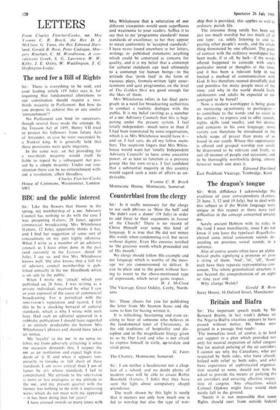BBC and the public interest
Sir: Like the flowers that bloom in the spring, my membership. of a BBC Advisory Council has nothing to do with the case I was presenting (Letters, 28 June), against commercial broadcasting. Mrs Whitehouse (Letters, 12 July), apparently thinks it has. and I find her suggestion of some sort of concealment on my part highly offensive. When I write as a member of an advisory council, as I have often done in the past (and currently in the Listener, dated 10 July), I say so, and this Mrs Whitehouse knows well. She also knows that a full list of advisory council membership is pub- lished annually in the BBC Handbook which is on sale to the public.
When I wrote my 'attack' which you published on 28 June, I was writing as a private individual, incensed by what I saw as your espousal of the cause of commercial broadcasting. For a periodical with the SPECTATOR'S reputation and record, I felt this to be a shocking betrayal of cultural standards, which is why I wrote with such heat. Had such an editorial appeared in a rubbishy publication I should have regarded it as entirely predictable (to borrow Mrs Whitehouse's phrase) and should have taken no notice.
My 'loyalty' to the Bac in no sense in- hibits me from adversely criticising it when the occasion demands this. I respect the BBC as an institution and expect high stan- dards of it. If and when it appears tem- porarily to forsake or fall short of these standards I am more critical than I am of lapses by ITV whose standards I fail to comprehend. My attitude to the SPECTATOR is more or less analogous to my attitude to the BBC, and my present quarrel with the former has nothing to do with it expressing views which do not meet with my approval —it has been doing that for years!
I have crossed swords so many times with
Mrs Whitehouse that a reiteration of our different viewpoints would seem superfluous and wearisome to your readers. Suffice it to say that to me 'programme standards' mean standards of excellence; to her they appear to mean conformity to 'accepted standards.' I have never found anywhere in her letters, writings or published statements anything which could be construed as concern for quality, and it is my belief that a contempt for cultural standards can lead ultimately to a contempt for human beings—to the attitude that 'prole feed' in the form of vacuous plays, formula-written light enter- tainment and quiz programmes on the level of The Golden Shot are good enough for the likes of them.
Mrs Whitehouse refers in her final para- graph to a need for broadcasting authorities to conduct a realistic dialogue with the public. It is my belief (writing as a member of a BBC Advisory Council) that this is hap- pening under the present system. I feel totally independent—much more so than if I had been nominated by some organisation, which is as Mrs Whitehouse would have it— and so, I feel sure, do all my fellow mem- bers. The suspicion lingers that Mrs White- house would want her 'totally Independent Advisory Councils' to have some executive power, or at least to function as a pressure group like her own NVALA. I feel confident that a substantial majority in this country would regard such a state of affairs as un- desirable.


































 Previous page
Previous page